
Tens of thousands of pending home sales across the U.S. fell through in March, according to a new report by Redfin, as growing economic uncertainty is leading many aspiring buyers to double-guess whether they should be making such an important investment.
Why It Matters
High prices in the U.S. housing market were one of the top issues for American voters’ during the 2024 presidential election.
President Donald Trump ran on the promise of lowering the cost of housing and boosting much-needed inventory, but some experts and critics have warned that his economic policies—including sweeping tariffs on trading partners and mass deportation of migrants—threaten to cause the cost of living to surge higher for American consumers and possibly plunge the country into a recession.
During times of economic downturn, housing demand normally falls as potential buyers face slower hiring and potential layoffs and are increasingly hesitant to buy even if they qualify for a mortgage.

FREDERIC J. BROWN/AFP via Getty Images
What To Know
According to Redfin data, roughly 52,000 purchase agreements were canceled in March, the equivalent of 13.4 percent of homes that were sold that same month.
It is the third highest March level of canceled home sales dating back to 2017, when the real estate brokerage started recording the data, after March 2023 (13.7 percent), and March 2020 (16.4 percent).
The highest shares of pending home sales that fell through last month were recorded in the same parts of the country that experienced a housing boom during the COVID-19 pandemic, with Florida and Texas cities dominating a list of the top ten cities with the most cancellations.
Orlando, Florida, reported the highest share of pending sales that fell out of contract, at 18.7 percent. Fort Worth, Texas, followed with 18.4 percent. The other cities in the top ten were San Antonio (18.1 percent), Las Vegas (18.0 percent), Miami (17.9 percent), Tampa, Florida (17.7 percent), Fort Lauderdale, Florida (17.5 percent), Atlanta (17.3 percent), Jacksonville, Florida (17.1 percent), and Riverside, California (16.4 percent).
Florida and Texas have built more new homes than any other state in the union over the past couple of years, and they are now seeing a growth in unsold inventory in their markets as rising housing costs, including historically high mortgage rates, discourage potential buyers.
Similar dynamics are making buyers reluctant to make a move across the country, where housing supply has hit a five-year high, forcing sellers to increasingly offer them concessions to seal the deal. These concessions, which effectively lower the cost of buying a home, can include money toward repairs, closing costs, and/or mortgage rate buydowns.
According to Redfin, 44.4 percent of U.S. home sellers offered concessions to buyers in the first quarter of the year, up from 39.3 percent a year earlier, and close to the record high of 45.1 percent reported at the start of 2023.
Seattle reported the highest share of sellers offering concessions in March, at 71.3 percent of all home-sale transactions during the first quarter. It was followed by Portland, Oregon, with 63.9 percent, Atlanta with 61.5 percent, San Diego with 60.7 percent, Denver with 59.2 percent, and Los Angeles with 56.1 percent.
What People Are Saying
Chaley McVay, a Redfin Premier real estate agent in Portland, Oregon, said in a statement: “Buyers used to ask for concessions to cover little things like repairs. Now they’re negotiating concessions so they can afford to buy a home. A lot of sellers are offering money for mortgage-rate buydowns, and I recently had one seller cover seven months of HOA fees for the buyer.”
He added: “Sellers are feeling nervous because a lot of them bought at the top of the market in 2021 and 2022, and will now be re-buying at a higher mortgage rate. They’re worried about net proceeds. That’s why I recommend my buyers ask for concessions instead of a lower sale price—it can be a win-win because then the buyer is catching a break and the seller doesn’t have to go below the price they had in their head.”
Stephanie Kastner, a Redfin Premier real estate agent in Seattle, said: “It’s super common to see seller concessions for condos and new-construction townhomes, but less so for single-family homes—unless the single-family home has been sitting on the market for a while.”
She added: “Condos have become a tougher sell because of skyrocketing HOA fees and insurance. And builders are offering concessions because it’s in their best interest to keep sale prices high; they’re willing to pay buyers’ closing costs and maybe provide a free washer-dryer if it means they don’t have to drop the listing price.”
Redfin Economics Lead Chen Zhao said in a statement: “Betting markets have the odds of a recession at higher than 50 percent, which is understandably making people wary of putting a big chunk of their money toward a house or a car.”
She continued: “Consumers are tightening their belts because they are rightly nervous about their job security and the prospect of paying more for everyday expenses. There are some potential silver linings for homebuyers: the drop in demand could cause home prices to stay flat, or even fall, and there’s some chance mortgage rates could drop in the next few months.”
What Happens Next
It is not clear how the Trump administration’s tariffs will affect global trade and the U.S. economy. If the country should enter a recession this year, demand for housing is likely to slow down significantly.
A recent survey conducted by Redfin proves that Americans are already considering delaying major life decisions like buying a home until the situation improves.
Nearly one in four U.S. residents told the real estate brokerage that they are canceling plans to make a major purchase this year, like buying a home or a car, because of Trump’s tariffs, while 55 percent said they are much less likely to do so.



